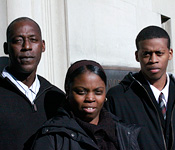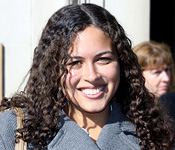The Supreme Court of Virginia is considering a key jurisdictional question in the case of Edgar Coker, a young Mineral, Va., man who was falsely accused of rape and whose legal team includes the University of Virginia School of Law's Innocence Project and Child Advocacy clinics.
Matthew Engle, co-director of the Innocence Project Clinic, argued on behalf of Coker before the state's high court on Friday.
Coker, who was 15 at the time of the accusation, pleaded guilty to rape and breaking and entering in 2007 on the advice of his lawyer after the prosecutor said he would try him as an adult and seek a lengthy prison sentence. Following his plea, Coker was committed to the Department of Juvenile Justice and placed on Virginia's sex offender registry for the rest of his life. (More)
Shortly after Coker's conviction, however, his then-14-year-old accuser recanted her accusation of rape. (More)
At issue before the Virginia Supreme Court now is whether Coker should be allowed to sue to overturn his conviction and be removed from the sex offender registry.
Coker's legal team filed a habeas petition — or a filing that seeks relief for unlawful detention — while he was on parole. A lawyer for the Virginia Attorney General's Office argued Friday that Coker's petition should not be allowed, as he is no longer incarcerated and therefore lacks jurisdiction.

"Once custody is no longer in the case, there is no longer jurisdiction," Assistant Attorney General Gregory Franklin said.
Yet Engle argued that Coker was unquestionably detained at the time of the petition's filing, as he was on parole at the time.
"There is no dispute that he was detained at the time he filed his petition," Engle said. "Jurisdiction is decided based on conditions that exist at the time a petition is initiated."
If the Virginia Supreme Court agrees with Engle's arguments, Coker's legal team would be able to get his case back in Stafford County Court, where they could argue that his constitutional rights were violated in the original trial because he received ineffective legal counsel.
Coker and his family are continuing to suffer harms from his convictions, even though he is no longer in jail, Engle told the justices. The family has been forced to move multiple times. Coker is publicly listed as a registered sex offender, making it difficult to find a job. If he is arrested, his sentence will be far tougher because of his prior convictions. And he is banned from school property, and was in fact arrested in fall 2011 while attending a high school football game.
"These conditions will persist for the rest of his life unless his wrongful convictions are reversed," Engle said.
Coker's mother, Cherri Dulaney, said her family's ordeal has been impossibly difficult.
"I can't even say it's been a nightmare," she said. "It's been beyond that."
Following the hearing, Engle and the rest of Coker's legal team expressed optimism, noting that the justices seemed to agree with their arguments and also asked a number of skeptical questions of the opposing counsel.
"I feel pretty optimistic," Engle said. "The justices were asking all the right questions."
When asked if she can "see the light at the end of the tunnel," given what she witnessed during Friday's hearing, Dulaney replied: "I do. I never saw that before."
Coker, who sat in the courtroom's front row with his parents, said he was also encouraged by the way the hearing went.
"I thought [Engle] did a very good job," he said.
Coker, who is now 20, said he has been taken aback by the amount of support he is receiving, including by his accuser's mother, Michelle Sousa, who attended the hearing.
"I'm out of words right now," he said. "I don't even know what to say."
Engle noted that it was particularly helpful to have Coker and his family in the courtroom.

"It was important for the justices to see Edgar with his parents," he said. "This is a strong family. They've been through hell together."
Third-year law student and Innocence Project Clinic participant Jessica Lee was one of a number of UVA Law students who attended Coker's hearing. Lee helped prepare the case's petition to the Virginia Supreme Court.
While Lee said she was encouraged by Friday's hearing, she said she is frustrated that it takes such a long time to clear the name of an innocent client.
"You have a client whose life is on the line," she said. "Even if things go well, there's still a whole other battle down the road. It's frustrating because we know he's innocent, but this process takes a long time."
Founded in 1819, the University of Virginia School of Law is the second-oldest continuously operating law school in the nation. Consistently ranked among the top law schools, Virginia is a world-renowned training ground for distinguished lawyers and public servants, instilling in them a commitment to leadership, integrity and community service.


